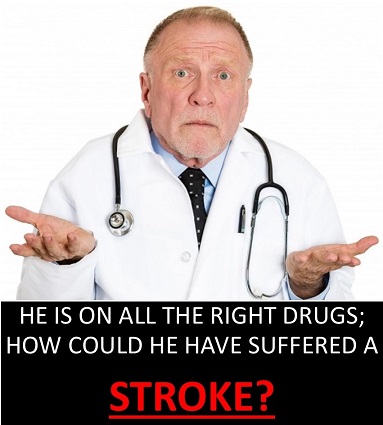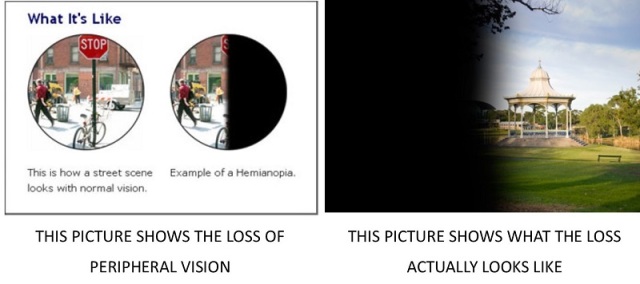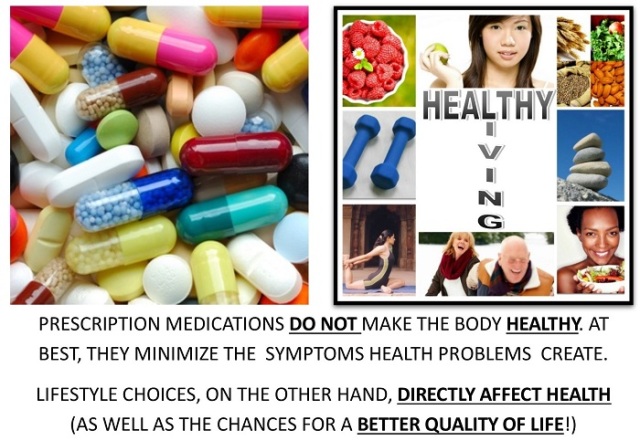 The gentleman was 89 years old. He was already taking Nifedipine and Atenolol (blood pressure medications,) Clopidogrel (a blood thinner,) Baby Aspirin (a blood thinner,) and Simvastatin (a cholesterol medication.) The combination of these pharmaceutical drugs were supposed to protect against cardiovascular disease and stroke.
The gentleman was 89 years old. He was already taking Nifedipine and Atenolol (blood pressure medications,) Clopidogrel (a blood thinner,) Baby Aspirin (a blood thinner,) and Simvastatin (a cholesterol medication.) The combination of these pharmaceutical drugs were supposed to protect against cardiovascular disease and stroke.
On February 9th, 2016, this gentleman drove himself to the eye doctor because he was experiencing visual field problems. As the eye doctor began performing his exam, he realized the gentleman was likely having a stroke. He CLOSED HIS OFFICE and drove the gentleman to the hospital. After undergoing an MRI, a stroke was detected in the occipital lobe (visual center) of the brain. He did NOT experience ANY weakness, cognitive dysfunction, slurred speech or sensory loss. The only clinical finding was complete loss of peripheral vision on the left side of his body.
The neurologist was shocked. The intern (his primary doctor) was shocked. His cardiologist was shocked. It didn’t make sense to any of them. He was on the proper medications and compliant with taking them EVERYDAY to prevent this type of outcome.
All of these doctors began rethinking the combination of medications and deciding what changes were needed. They worked DILIGENTLY wanting to prevent a recurrence of another stroke.
WHAT WERE ALL THESE DOCTORS MISSING?
While I sat with this gentleman at each doctor’s appointment, I waited for these doctors to discuss a MAJOR CONTRIBUTING FACTOR resulting in strokes. Not ONE doctor mentioned this MAJOR FACTOR called:
DIET!
This gentleman had dietary habits that significantly increased his risk for diabetes, cardiovascular disease, and stroke. Whether he chose to comply with changing his dietary lifestyle or not, ALL OF THESE DOCTORS had a responsibility to explain his poor dietary habits INTERFERED with the ability of the medications he was taking to protect him from these diseases. Regardless of any medications added (or increased in dosage,) they would NOT ADEQUATELY PROTECT HIM from future health complications unless accompanied by a new and improved nutrition plan. Unfortunately EACH and EVERY DOCTOR excluded this explanation leaving out a VITAL contributing factor often resulting in strokes. It was not until I questioned EACH OF THESE DOCTORS in front of the gentleman that they agreed that poor dietary habits would significantly interfere with the effectiveness of the medications prescribed.
Like most people, the gentleman assumed he could live the lifestyle he was enjoying without ANY complications as long as he “took his medications.” He believed these medications “made him healthy.” Afterall, until having the stroke he was regularly complimented about how “healthy he was for his age!” Here was an 89 year old man with high blood pressure, borderline diabetes, high cholesterol, abnormal iron levels and frequent headaches believing “he was the picture of health for an 89 year old man.” What were these doctors thinking reinforcing such an INACCURATE PICTURE of his health? Did they actually LOOK at the man and and his health complications or simply view his lab panel and the ranges he was in? HEALTHY people do not suffer STROKES! Those with health problems initiated and complicated by destructive lifestyle choices and treated primarily with pharmaceutical drugs (ALONE) do!
.
There are many people walking around today in their 50’s, 60’s, 70’s and 80’s taking these same types of medications while living the same destructive dietary lifestyle as this 89 year old gentleman. They too believe they’re in “GOOD HEALTH” because their doctors make the same COMMON MISTAKES qualifying their health based on LAB VALUES rather than using GUIDELINES determining how well BALANCED their patient’s lives are (physically, mentally and emotionally.)
If you, the patient, do not ACTIVELY participate beyond swallowing a pill or injecting a prescription,
YOU WILL DEVELOP DISEASES
beyond ANY medication’s control. No one says, “I’m the next heart attack,” “I’m the next stroke, ” “I’m the next diabetic” or “I’m the next cancer diagnosis.” NEARLY EVERYONE, however, believes once they’re diagnosed and prescribed medications, they’re “FIXED” (or at the very least, “HEALTHY” again.)
A “HEALTHY” AND/OR “FIXED” PERSON DOESN’T NEED OR TAKE PRESCRIPTION DRUGS!
.
The sooner you’re willing to open your eyes to this TRUTH, the better the chances of TRULY FIXING your health PROBLEMS and RESTORING GOOD HEALTH to YOUR BODY. Some may still need supportive pharmaceutical intervention, but the majority will be able to live life as intended, WITHOUT IT!
How many more “CONFUSED DOCTORS” will it take for you to realize:
THE SOLUTION TO MUCH OF TODAY’S BAD HEALTH IS SIMPLY HEALTHY LIVING
.
I dare you to try it! Go ahead,
PROVE ME WRONG!





golden information! what percentage of diseases are caused by poor diet do you think?
LikeLiked by 1 person
Overweight and obesity now consume 65%+ of our population in the U.S. alone. Add the other main diseases like diabetes (type 2,) cardiovascular disease and cancer and the percentage would significantly increase. This is why the SOLUTION to health maladies and disease will NEVER be found in prescription drugs. They may play a role, but without dietary BALANCE too large a part of the answer is missing!
LikeLiked by 1 person
[…] via THE STROKE THAT CONFUSED DOCTORS — All About Healthy Choices […]
LikeLiked by 1 person
Diet and lifestyle are the factors indeed. The drugs may help temporarily.
LikeLiked by 1 person
Looking at prescriptions medications as a “supplement” to healthy living would likely result in a better outcome; so much so, that many would no longer need the medication.
LikeLike
Agreed: Caveat- sometimes crappy things happen to healthy, active and compliant people.
LikeLiked by 1 person
There are no guarantees, however, the odds of achieving better health are dramatically improved by living a lifestyle that supports healthy living.
Thank you for adding your comment to this post.
LikeLiked by 1 person
Agreed, absolutely. It’s a personal comment- My dad was a very healthy, active and fit person- and he unexpectedly had a severe stroke. Perhaps the 80/20 rule applies: 80% can be avoided with good, healthy living.
LikeLiked by 1 person
Yes. I’ll take those percentages for the population any day of the week. We would be living with significantly less stress and disease and more personal fulfillment.
LikeLiked by 1 person
🙂
LikeLiked by 1 person
A truly eye opener.
LikeLiked by 1 person
So glad you found the information beneficial.
LikeLike
Doc I have my entire family suffering from High Blood Pressure and Diabetes, but dietary habits of them have never changed. Even I was in impression that once you are taking medicines you can be lenient while eating. But your article prove to be an eye opener. Your words and communication skills are powerful doc. Thanks for sharing your wisdom.
LikeLiked by 1 person
I am so glad my articles are creating greater awareness. This is a primary goal of my writing.
A key concept is understanding GOOD HEALTH requires ACTIVE PARTICIPATION. This helps people LEARN to become more involved in their health and the DECISIONS regarding treatment options. There are good quality options of care rarely exposed to the public by traditional health care providers. People must understand that health care is a BUSINESS. This means their is potential for bias in treatment recommendations.
One of the most important questions one can ask is, “will this recommendation correct the ROOT CAUSE of my problem, or will it simply address the SYMPTOM?” Is the doctor attempting to help RESTORE GOOD HEALTH to the body or simply MANAGE an ONGOING DISEASE (ex. pills for high blood pressure.)
As we begin to THINK in these terms, our approach to health and disease dramatically alters. As people open their minds to this IDEA, they expand their opportunities for QUALITY LIVING and HEALTHIER OUTCOMES.
LikeLiked by 1 person
Great information! Although I do need to work on some aspects of healthy living, I do not take ANY medication. When I’ve had appointments for check ups, etc. I remember times when medical staff has been shocked that I take NO medication. One doctor said, “I hope you can keep it up.” He wasn’t encouraging, he meant he thought sooner or later that I would HAVE to be on meds–despite no reason to be. I have suspected for a long time that doctors are trained to treat symptoms, not to look for root causes that can be FIXED. I guess in a way my Special Ed background has taught me to look for root causes and to me it’s common sense to apply that approach to all situations.
LikeLiked by 1 person
I have learned that common sense isn’t all that common.
It’s funny, I had a similar experience at my physical as well. They asked me repeatedly about my medications and I repeatedly told them I wasn’t taking any prescriptions. Just goes to show the percentages of people on meds these days.
This was followed up by a nurse telling me my BMI was borderline for being overweight. As a weightlifter, the BMI number isn’t accurate based on a disproportionate lean body mass number. At nearly 5″10,” I have a 29 inch waistline and a body fat of 7%. I told the nurse before she offered information to her patients, she should LOOK AT THEM to see if the “math” (BMI number) fits the clinical presentation. She informed me her job was to simply relay the numbers and explain where they fit on the guideline. How sad is it to be more concerned about following an office standard regardless if the information conveyed was accurate or not?
LikeLiked by 1 person
Wow that is sad. It does help explain something to me though. I’ve read books and seen TV segments where a person is well within weight/height requirements and a “trainer” is telling them they are too fat (basically) due to their BMI number. Most of the people I’m talking about were also rather athletic. I don’t recall if any of them were weight lifters, but it wouldn’t surprise me.
LikeLiked by 1 person
BMI is ONE piece of information used when determining the health status of an individual. I incorporated it in my practice when it accurately applied. We must begin looking at patients as WHOLE PEOPLE. Determining the health of an individual would, therefore, require extending current boundaries beyond simple lab panels and BMI numbers. It’s not hard to do. It’s much harder to change professional health care provider’s ATTITUDES and their willingness to expand their definitions of “GOOD HEALTH.”
LikeLiked by 1 person
As always, a great post.
I had a thought while reading this – who even likes to take all these pills? When you have to have a container labeling all your pills and when you need to take them and all the related requirements for taking them (take with food, take with water, chew, swallow, etc.), it seems to me that alone would suggest there is something wrong. You can’t be well if you’re required to have a special kit just to keep your pills straight – to say nothing of how annoying it would be to constantly have to organize them, take them, keep them straight, etc.
LikeLiked by 2 people
I love your point. This is why I enjoy comments so much. I never thought in the terms you discuss which makes such GOOD common sense! Thank you for sharing your WISDOM with all of us!
LikeLiked by 2 people
It’s amazing – I think people probably get told that they need these drugs, and they lose all common sense because it’s something their doctor(s) said. So clearly, to them, it has to be OK.
LikeLiked by 1 person
What people need to understand is there are many different ways to achieve a similar outcome. Anyone believing their ONLY option ENDS at a pharmaceutical product is typically wrong. The “solution” must fit the NEED of the INDIVIDUAL using an APPROACH that respects the INDIVIDUAL person’s health and personal philosophy.
LikeLiked by 1 person
Excellent!!! 👏🏻
LikeLiked by 1 person
Love the “applauding hands.” I’m glad you enjoyed the article.
LikeLike
So true!! I have seen and felt the difference between the two. I will continue on the same path because I do not want to put any of those chemicals in my body. Thanks as always for the info 🙂
LikeLiked by 1 person
Since you have experienced both, your opinion adds even greater value for all of us to learn from. Keep up the good work.
LikeLiked by 1 person
Thank you ! I am applauding you !!! Excellent Excellent Excellent !!!
LikeLiked by 1 person
People need to be made aware of these important, yet simple FACTS. Without food, we die! Without medicine we may or may NOT die. Yet food isn’t a PRIMARY topic of discussion during an office visit. It seems our priorities need to be re-evaluated!
LikeLiked by 1 person
You must know when I need to read a good post….one that hits home….thanks….
LikeLiked by 1 person
Thank you, Kat.
LikeLike